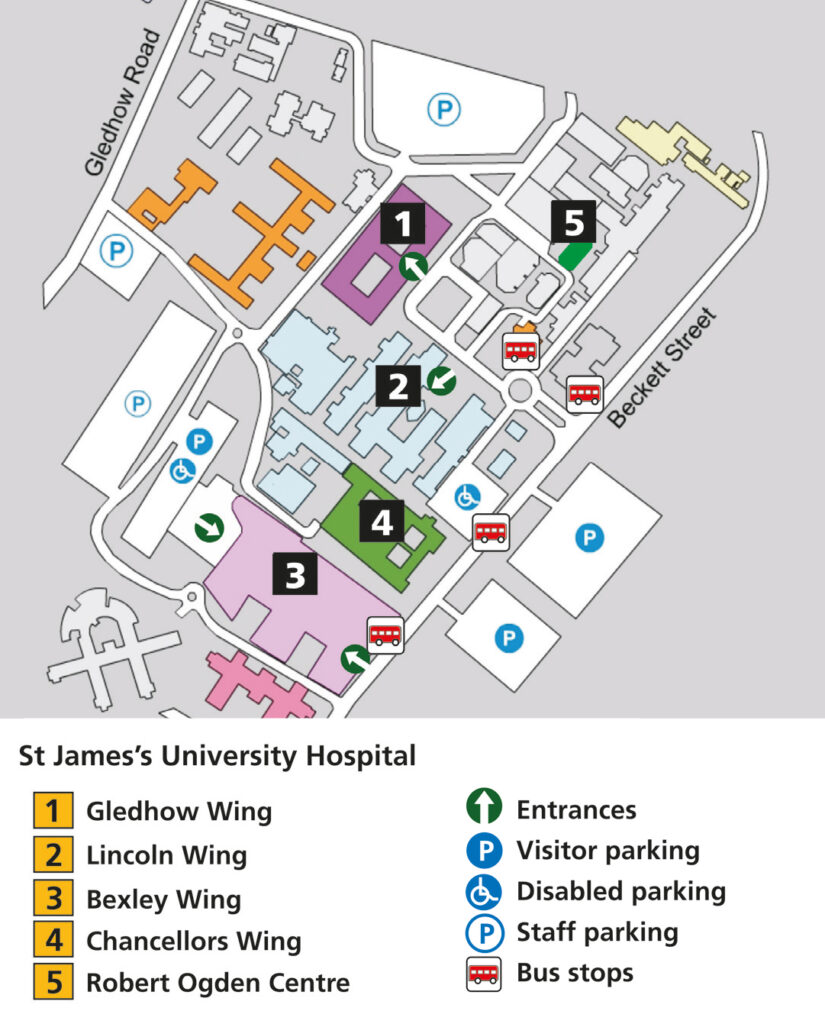It will be given to you in addition to the information you will receive from your clinical oncologist (who is a specialist doctor in cancer treatment). Their team will be caring for you during your treatment. This team will include radiographers and clinical nurse specialists, but may also include social workers, physiotherapists, occupational therapist and dietitians.
The leaflet describes radiotherapy planning and treatment. It also explains the side-effects which you may experience during and after treatment.
Each person’s treatment will vary, so the information given is a general guide. The healthcare team looking after you will explain your treatment and the side-effects in detail. If you have any questions after reading this leaflet, please speak to the team looking after you or ring the numbers at the end of the leaflet.
Staff will make every effort to meet your individual needs or will direct you to the person who can help.
All your radiotherapy planning and treatment will take place in the Radiotherapy Department on level -2, Bexley Wing, Leeds Cancer Centre, LS9 7TF.
Please do not bring valuables into hospital with you as the Trust cannot accept liability for loss or theft.
What is radiotherapy?
Radiotherapy is the use of high energy X-rays and other types of radiation to treat cancer. The radiotherapy causes damage to cancer cells in the treated area. Although normal cells are also affected, they can repair themselves and are able to recover. Radiotherapy is a local treatment. This means it only affects the part of the body that is treated.
When you are having your radiotherapy you do not feel anything and it does not make you radioactive. You may hear a buzzing noise when the machine is switched on. It is perfectly safe for you to be with other people, including children and pregnant people throughout your treatment.
You will have your radiotherapy on a treatment machine called a Linear Accelerator as shown here in the photograph.
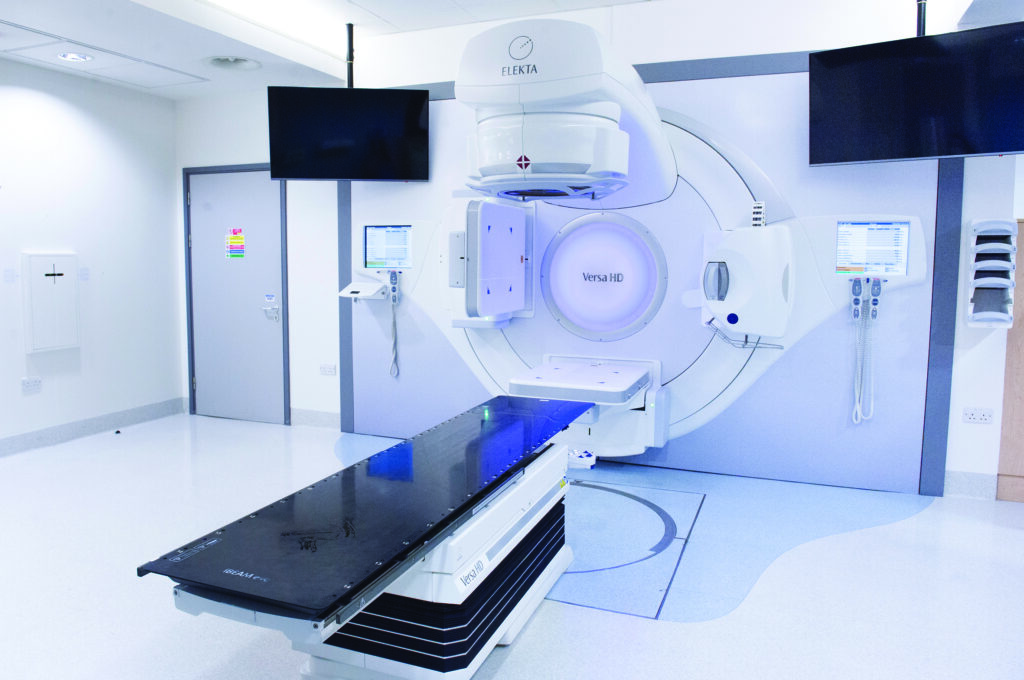
You will see your radiographers at each treatment session, and they will be happy to answer any questions you may have.
How often is it given
Radiotherapy is usually given over one day to six weeks. This is a total of between 1-33 treatment days. Treatment is usually given daily, Monday to Friday however your treatment may not start on a Monday.
Whenever possible you will be treated at the time of day that suits you, but this cannot always be arranged or guaranteed. There may be occasions when you may have a longer stay in the department or be asked to attend at a different time, for example to see your oncologist.
You may need to be treated on a weekend during the day due to a bank holiday and we will let you know if this is the case. Your radiographer will be able to explain the details of your individual radiotherapy appointments.
Your treatment will usually be given as an outpatient.
Visiting us before your treatment
If you would like to visit the radiotherapy department before starting treatment, please call 0113 206 7603. This visit can be very useful as you can find out more information about Radiotherapy and ask questions.
Patient quote
‘I was so pleased to see the machines before my treatment and the staff were so helpful and really put my mind at rest’.
Who will I meet?
Therapeutic Radiographers
Radiotherapy is given by therapeutic radiographers of all genders, who are highly trained in the accurate planning and delivery of radiotherapy treatment. You will see your radiographers at each treatment session and they will be happy to answer any questions you may have.
Student Radiographers
The radiotherapy department is a training centre for therapeutic radiographers. They are supervised at all times. If you do not wish students to be present, please speak to a member of staff. This will not affect your treatment or care.
Others involved in your care
You may meet other staff whilst you are coming for radiotherapy. Everyone you meet will introduce themselves, tell you their job title and explain the role they have in your care.
Important advice before your treatment
Pregnancy
It is important that patients who could become pregnant are not pregnant at the start of a course of radiotherapy and that they do not become pregnant during a course of radiotherapy, because it can have an effect on the unborn child. Use an effective form of contraception, for example condoms, coil, depo injection, or contraceptive pill.
For more information see the ‘Contraception and pregnancy during cancer treatment’ leaflet. Please do not hesitate to ask your doctor or nurse if you have any questions or concerns about these issues.
Planning your treatment
Your first appointment for radiotherapy will be a planning appointment. This will be used to gather all the information we need to accurately plan your treatment. We will contact you by phone, with an appointment for your radiotherapy planning session. Directions to the hospital and transport arrangements will be discussed with you at this point.
Some tests and scans may be needed to help plan your treatment. We will explain which of these you will need when your appointment is made.
You may see your clinical oncologist (or a member of their team) at this appointment. This is an ideal opportunity for you to ask questions.
If you have not previously consented to your treatment you will be asked to sign a consent form.
What to bring with you
- A list of all questions you may have;
- An up-to-date list of all the medications you are taking (including inhalers, sprays, vitamins or herbal products);
- Any medication that you may need during your visit;
- Something to eat and drink and something to keep you occupied as this first visit can be quite lengthy (up to two hours).
Treatment position
Your treatment position depends on which part of your lung is to be treated. The following explains the different positions we may use for your planning and treatment. Usually only one position will be used throughout your treatment.
The picture here shows one of the possible treatment positions. You need to be able to keep this position for about 15 minutes each day during your treatment.

If you are not comfortable, please tell the radiographers straight away. If you have any problems with your arm mobility and think you are unable to hold this position, please tell your Consultant or specialist nurse before this planning appointment. This gives the team time to discuss alternative arm positions before you arrive.
Mould room
You may need to have a plastic mask made, as shown in this picture. This can happen when you cannot get or keep your arms above your head. You may also need a mask if the lung cancer is in the top of the lung.
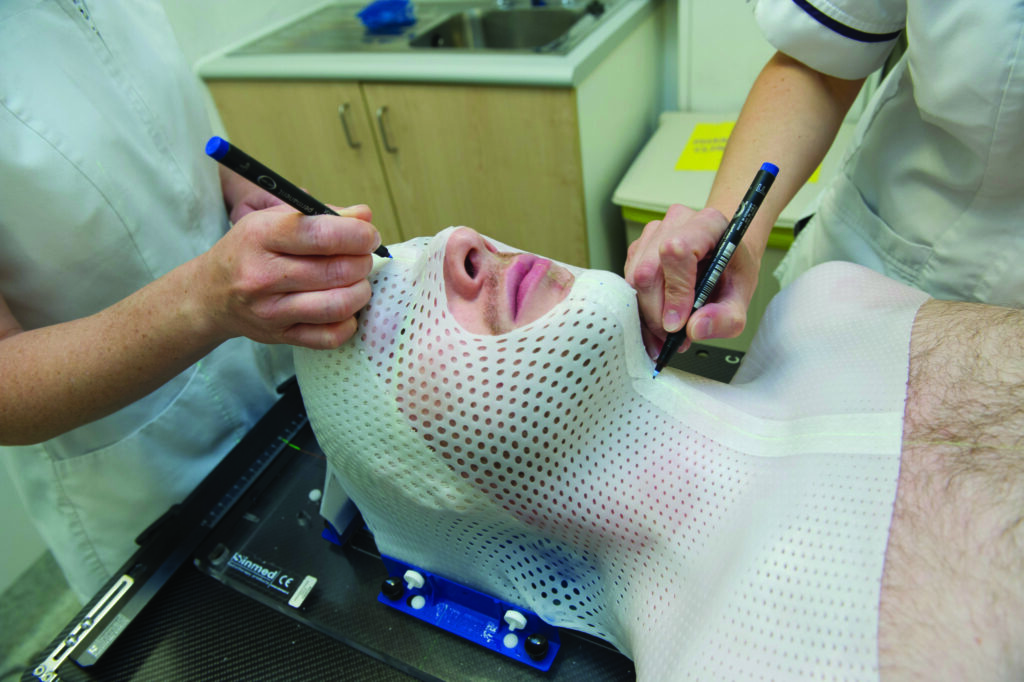
This will be made the same day as your scan and helps supports your head and neck for treatment. The radiographers can draw treatment marks on your mask, instead of your skin.
If you have any concerns about the mask, please let your clinical oncologist or a member of their team know. We have a support team who can help you. Please ask one of the healthcare team to contact them for you or ring:
0113 206 7616 or email [email protected].
Your planning scan
In order to plan your treatment you will have a planning CT scan. This is done on a machine called a CT Scanner, shown here in the photograph. It allows the images from the scan to be sent to the radiotherapy computer planning system.
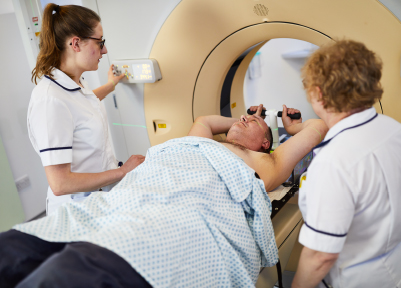
There will be several members of staff present at your scan. These will include therapeutic radiographers, possibly a mould room technician and a dosimetrist (the person who will produce the computer plan for your treatment).
Planning scans are not diagnostic examinations and will not be reported as such.
The scan will be taken with you lying in the same position as for your treatment. The radiographers will draw some marks on you, to be used as a reference for your treatment.
You will then be scanned, which will only take a few minutes. At the end of the scan the skin marks will be replaced by permanent marks (tattoo).

These permanent marks help us to ensure you are in the same position each day. It also means that you can wash without worrying about your marks coming off.
Following the scan the radiographers will give you the time of your first appointment on the treatment machine. This is most likely to be a couple of weeks after the planning visit. The radiographers will talk to you about any further appointments you have.
4D Scan
Sometimes we need to monitor your breathing during the scan, so a belt is placed around your stomach which is attached to the scanner to monitor you. This type of scan can take longer, lasting 30 minutes.
Contrast (dye)
A special contrast agent, often called a dye, may be used for your scan to make specific organs, blood vessels and/or tissue types ‘stand out’. This can make it easier for the doctor to plan your treatment.
The dye is given through a very small plastic tube called a ‘cannula’ into a vein in your arm. You should tell the radiographer if you have any allergies, but they will go over this before they use any dye. The radiographers will advise you about drinking plenty of fluid after your injection.
Contrast side-effects
You may notice a warm feeling throughout your body and have a metallic taste in your mouth. You may also feel as if you have passed urine. This will pass very quickly. There is a slight risk of an allergic reaction to the injection, such as a skin rash, but very rarely may lead to other complications. The staff in the radiotherapy department are highly trained to manage any complications and again the risk involved is very small.
You will be able to drive your car or go to work after your scan.
Having your treatment
When you arrive for your treatment you should go to the radiotherapy main reception desk at the entrance of the radiotherapy department.

On the first occasion you will be given all your appointments and be escorted to the waiting area for your machine. The radiographers will explain what will happen and answer any questions that you may have.
You may need to undress and put on a gown; the radiographers will discuss this with you when you first attend the department.

The radiographers will position you, and adjust the couch and machine to the correct positions. For the first few treatments and also intermittently during treatment we will also take images to check the accuracy of the treatment. This will take a few more minutes.
These images do not monitor your condition but are purely for treatment accuracy.
You will be asked to stay as still as possible during treatment but you should breathe and swallow normally. Once you are in the correct position the radiographers will leave the room to switch on the machine. You will only be alone for a few moments at a time.
The radiographers will be watching you on a closed circuit TV (CCTV) monitor during treatment. The CCTV camera is not recording or saving any images. There is also an intercom system so the radiographers can talk to you.
If you would like to listen to music during your treatment, please let us know.
The treatment only takes a few minutes but you will be in the treatment room for about 10-20 minutes. The machine stops automatically after your prescribed dose of treatment has been given. The radiographers can stop the machine at any time if needed. The treatment machines make a buzzing sound when they are switched on. You do not feel anything.
The radiographers may need to come in and out part way through each treatment. After the treatment is complete the radiographers will come back into the room and help you off the couch.
On some days the radiotherapy department may be busy and there may be a delay before your treatment. We will keep you informed of any delays over 30 minutes. Please see the delay signs in your waiting areas. It may be a good idea to bring something to eat and drink with you, including any supplement drinks you have been asked to have and any medication you may need. There is a restaurant and café available on level 0.
Your treatments will generally be on the same machine, although there may be days when the machine is being serviced and your treatment will be in a different room.
It is very important that you do not miss treatment days as it may make your treatment less effective. If you feel you are unable to attend for any reason please telephone us so that we can discuss this with you. If you have any queries about your appointment times please discuss these with the radiotherapy coordinators on your treatment unit.
Side-effects
Side-effects can be divided into short term (acute) effects, that happen during or soon after treatment, and long term effects occurring months or years later. Some side-effects are common, whilst others are rare. The area and amount of treatment given to you will affect which side-effects are most likely to happen to you. Your oncologist will discuss this with you. If you develop any radiotherapy side-effects you will be given advice and support by your healthcare team.
Short term side-effects from radiotherapy
Most side-effects are common and are temporary. Side-effects tend to build up from about the second week of treatment and will be at their worst at the end or just after the treatment course. They generally last a number of weeks or months after the treatment has finished.
Tiredness (fatigue)
Nearly all patients having radiotherapy will feel tired. Be prepared to take things easy during treatment and allow for extra rests. Try to continue with some of your normal routines and activities if possible.
Fatigue usually improves in the weeks to months after treatment.
Things you can do to help include:
- Gentle exercise can help reduce the symptoms of fatigue.
- Having enough to drink can prevent tiredness caused by dehydration.
- Small meals or snacks eaten more often than three times a day may be easier to face.
- Try to get a good night’s sleep where possible, a daytime nap may help.
- Try to ‘pace’ yourself, listen to what your body is telling you, rest if you need to.
- Pick out the things that you enjoy, and try to delegate other tasks.
- Little and often is the rule of thumb.
There is a Macmillan information leaflet available called ‘Coping with fatigue’. If you would like a copy, or support with your fatigue please ask a member of staff.
Mild chest discomfort
You may experience mild chest discomfort, shivering and increased temperature a few hours after treatment. This usually settles quickly and can be helped with paracetamol.
Discomfort on swallowing
This may start to occur after about five treatments, and is due to the gullet (food pipe) reacting to the radiotherapy. As well as difficulty swallowing you may also experience pain and heartburn (indigestion). If you experience any of these side-effects you will be given some information, advice and medicines to help relieve these problems.
You may also find that a soft or liquid diet is easier to swallow. Allowing hot drinks and soup to cool down may also be helpful. It may be 2-3 weeks after finishing treatment before this starts to improve. Please continue with any medicines and dietary supplements until you feel it has improved. If necessary you will be referred to a dietitian who will give you advice and support.
Dry irritating cough
If you have a cough the radiotherapy may temporarily make it slightly worse. If it becomes troublesome please see your doctor, radiographer or nurse.
Loss of appetite
Your appetite may vary during your treatment. Try to eat well during your treatment and also drink about two litres of fluid each day. There is a leaflet available called ‘Eating well during your treatment’, please ask a member of staff if you would like a copy.
Hair loss
Only hair in the treated area will stop growing and may fall out. Your doctor will tell you if you might lose your hair.
Sometimes hair will not grow back after treatment.
Skin reaction
The skin in the treated area starts to redden or darken about 10 days after starting your radiotherapy. It may become dry and itchy.
Avoid hair removal where possible, including shaving, waxing, cream and lasers unless advised otherwise by your consultant, nurse or radiographer.
Before you go in for your treatment the radiographer will explain what will happen to your skin and how to look after it. They will also give you a leaflet to take home.
Nausea or sickness
Occasionally patients may feel sick or may actually be sick. Please let the radiographers know so they can arrange for some treatment for you.
Delayed side-effects
Radiation Pneumonitis
The careful planning of your treatment keeps the amount of normal lung receiving radiotherapy to a minimum. However, lung radiotherapy can cause a reaction in the lungs weeks to months after finishing your radiotherapy treatment. The reaction is due to inflammation in the lungs caused by the radiotherapy. This inflammation is called ‘Radiation Pneumonitis’. This most commonly causes patients to be more short of breath, sometimes with a dry cough and occasionally with raised temperature. This can be serious. On rare occasions it can be life-threatening, so it is very important that you contact your Oncologist or Lung Specialist Nurse if you get these symptoms. They can then arrange for you to be reviewed.
If your Oncologist thinks you have Radiation Pneumonitis, you will be asked to take oral (by mouth) steroid tablets. This medication aims to reduce the inflammation in your lungs, to prevent it from getting worse, and to improve your symptoms.
Late Oesophageal Side Effects
In some patients, there is a risk of long-term scarring and narrowing of the oesophagus (food pipe) as a result of the radiotherapy. This risk is higher in patients who receive chemotherapy and radiotherapy. This narrowing is known as ‘stricture’.
If this happens, you may notice a feeling of food getting stuck as you swallow or of pain on swallowing.
This can be treated by gently expanding (stretching wider) the narrowing in a procedure called ‘endoscopic balloon dilatation’. This is done using a camera to look down inside your oesophagus. A balloon is then used to gently expand the narrowed area.
Sometimes a small tube called a ‘stent’ is also needed and can be put in at the same time. This stent keeps the narrowed area open.
Very, very rarely radiotherapy can cause the oesophagus to be damaged. You might develop a hole (‘fistula’) in the oesophagus. This means that food and liquid can go into the lungs and cause a chest infection. This is potentially a serious and sometimes life-threatening complication of the radiotherapy. The ‘hole’ can be treated with stents to cover the area. However, this can be permanent and patients may need to feed themselves in different ways.
Your doctor will explain and discuss this with you if you are thought to be at risk of this.
Brachial Plexopathy
If your treatment is at the top of your lungs, the brachial plexus may receive radiation dose. The brachial plexus is a network of nerves which supply the arm. Careful planning is performed to limit the dose to this area as much as possible. However, depending on the location of the treatment area, some dose will be inevitable with the potential risk of developing ‘brachial plexopathy’. This may cause weakness/numbness of the shoulder, arm, hand or wrist, also tingling, burning, pain or abnormal sensations.
If there is a risk of this, the doctor will go through this with you during your consent appointment.
Lung Scarring
Months to years after your radiotherapy treatment, scarring of the lung (the area that was treated) could happen. This scarring is permanent and can cause a small portion of the lung to collapse.
In most patients this does not affect their breathing but sometimes this scarring and collapse can make you more short of breath. If you are not on oxygen before lung radiotherapy, you may need to have oxygen for a short time. In very rare cases you may need oxygen therapy permanently as a result of this treatment.
Very rarely a larger portion of the lung may collapse; this could be life threatening. The risk of this happening is very small.
Chest wall pain and rib or bone fractures
If the tumour is close to the ribs there is a chance that the radiotherapy may weaken the ribs and cause pain and rib fracture. Often this does not cause any symptoms and is discovered when you have a scan after your treatment. Rarely these rib fractures can cause pain that requires pain killers, sometimes for a long period of time. Your doctor will discuss this with you.
Please note:
Please read the information leaflets enclosed with any medications used. This will explain any side-effects you may experience when taking them.
If you are at all concerned about any side-effects you are experiencing from your medication, please talk to your pharmacist, nurse specialist or GP.
When radiotherapy has finished
Your side-effects may get worse in the first few weeks after treatment and will then gradually settle. You should start getting back to normal about 4-6 weeks after treatment but it may take a little longer. Tiredness can last for several months and you may need to continue to rest more than usual.
You may be asked to attend the hospital where you were first seen by your oncologist for follow-up checks at regular intervals. This will vary according to the area you have had treated. Please discuss this with your doctor if you have any concerns.
Planning a return to work
If you find that you are tired after your treatment has ended you may consider taking a break from work or working part- time. It can be useful to talk to your employer about returning to work gradually, i.e. shorter or fewer days at first.
Your GP can recommend this on your fitness to work note. The Macmillan booklet ‘Work and Cancer’, offers help and advice on all areas of work during your cancer treatment.
Research at Leeds Cancer Centre
Leeds Cancer Centre is a major centre for cancer research. You may be asked if you would like to take part in clinical studies or trials linked to your condition. You do not have to take part in any trials, unless you wish to do so. If you do not wish to take part in a trial your treatment will not be affected in any way. If you do take part in a clinical trial you may meet a research nurse or radiographer, who will be helping to run the trial.
Further information and support
If you have any questions please ask your hospital team. We all have our own ways of coping with difficulties.
Some people have a close network of family and friends who provide emotional support. Others would rather seek help from people who are not involved with their illness.
The following are also available as sources of information and support that you may wish to use.
Clinical Nurse Specialists (CNS)
Your CNS is available to discuss any aspect of your treatment with you. You will be seen by a CNS before your treatment. This is to offer support and advice about the practicalities and effects of your treatment and answer any questions you may want to ask.
Your CNS will also assess and discuss any physical, psychological, social, occupational and spiritual needs that you may have. They can refer you to other services if needed, for instance, benefits advice.
You should be given a ‘key worker’ as a contact for support through your treatment; this is usually your CNS.
Macmillan Specialist Radiographer and
Macmillan Radiotherapy Nurse Specialist
Sometimes people need more help if they are feeling depressed, very anxious or are having problems with their treatment. If this is the case you may benefit from seeing the Macmillan radiographer or nurse specialist.
Your oncologist, radiographer or nurse can refer you at any point before or during your treatment.
Local Support Services
Leeds Cancer Support
Leeds Cancer Support complements care provided by your clinical team. We offer access to information and a wide range of support, in a welcoming environment for you, your family and friends.
We can be found in the information lounges in Bexley Wing and also in the purpose built Sir Robert Ogden Macmillan Centre (behind the Thackray Medical Museum).
The Sir Robert Ogden Macmillan Centre
This centre offers a variety of free health & wellbeing and supportive therapies for patients, their family members and carers. These include hypnotherapy, mindfulness coaching, acupuncture (for hot flushes) and pilates.
Contact numbers for Leeds Cancer Support
Maggie’s Centre
If you or someone you love has cancer you may have lots of questions. Maggie’s is a warm, welcoming place where you can meet people who are experiencing similar things to you.
You may also be able to find support groups specific to your needs and get advice and information from their professional staff. You don’t need an appointment and all support is free.
National Support Organisations
Refreshments
There is a restaurant and coffee shop available on Level 0, which are open daily. They serve drinks, light snacks and hot meals. Vending machines are also available in the main radiotherapy waiting room and Level 0. There is also a shop on Level 0 with books, papers and snacks.
Hotel Bexley Wing
Patients having radiotherapy or chemotherapy sometimes use the hotel if they have a long way to travel. The hotel is located on the 8th floor of Bexley Wing and offers 19 twin rooms and 1 single room. All have en-suite, tea and coffee making facilities, a mini fridge, towels, hairdryer and digital television. There are two rooms with wheel chair access and a wet room.
Patients are able to stay free of charge. There is a charge for relatives if they are staying in their own room.
Meals can be purchased (at breakfast and lunch) if you are able to make your way to the restaurant in the Bexley atrium. At other times you will need to have something you have brought from home or purchased. There is a very small fridge for your personal use. There are no staff after 4pm until the next morning in this facility.
Car Parking
When you are coming for radiotherapy planning and treatment your parking is free in the on-site multi-storey car park. Please ask for more information at the radiotherapy main reception desk.
How to find us
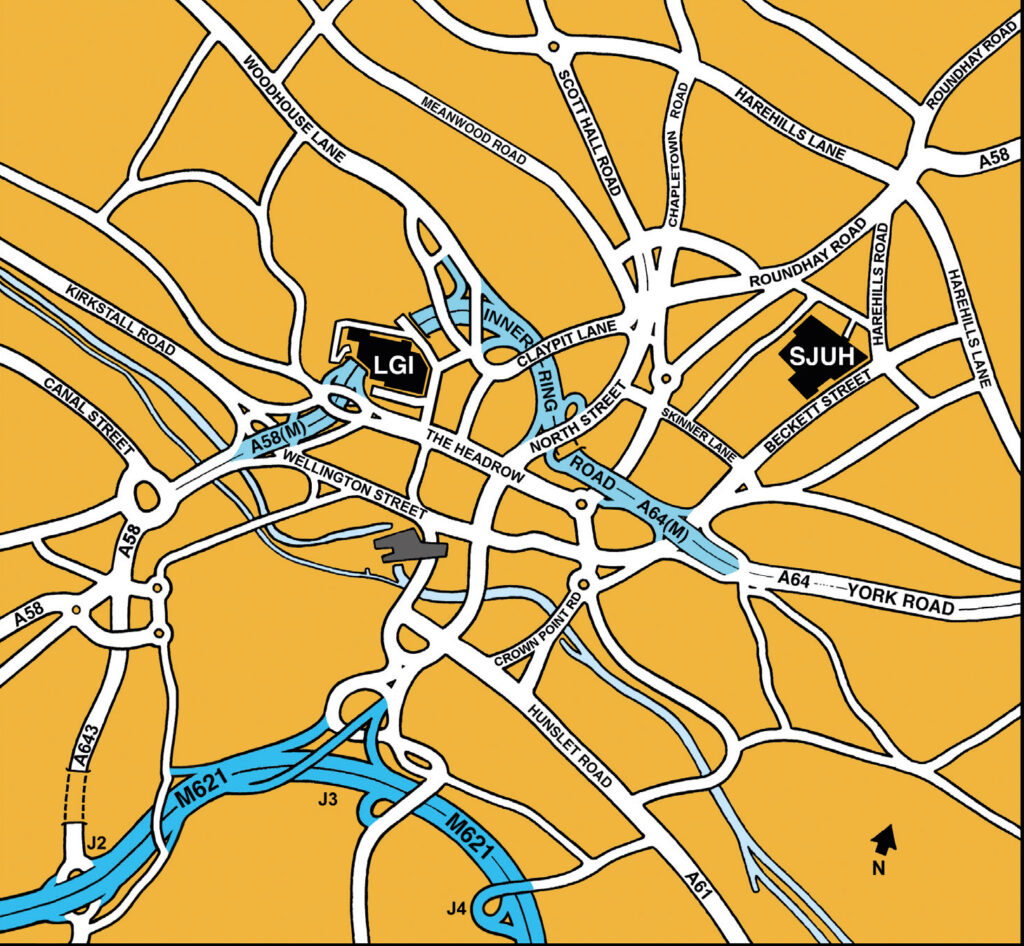
St James’s University Hospital – site plan
